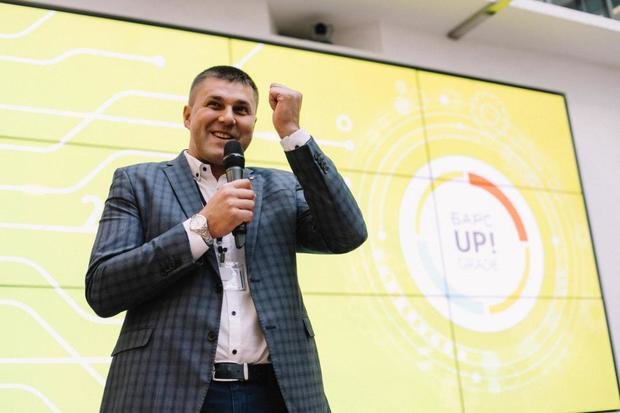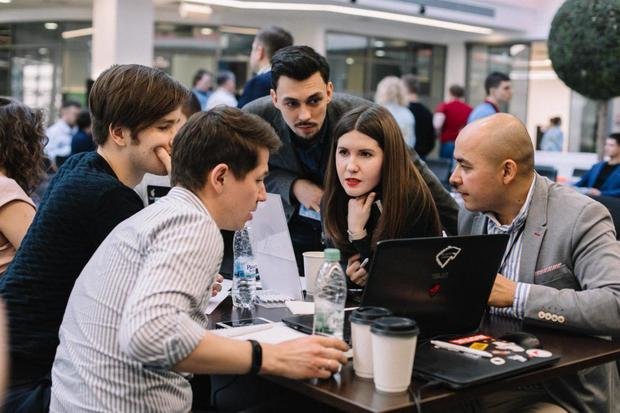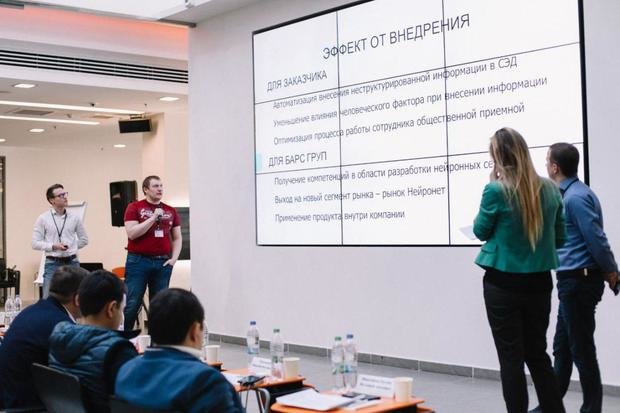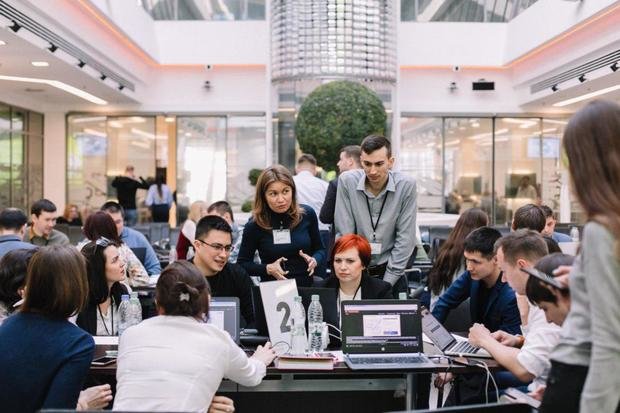''We are so digitalised that we even don’t notice''
What a digital economy is, and how it changes our life
The government of Russia plans to spend about 522 billion rubles to fulfil the programme ''Digital Economy''. There are several key areas – from smart power engineering, finance, artificial intelligence, security system, unmanned planes, craft and car to smart food and personalized medicine. Leading IT companies generate ideas in accordance with these themes. Realnoe Vremya visited one of such brainstorm events.
''I want to give the waiter a tip but I don't have cash''
The programme ''Digital Economy'' is designed until 2024 and will need about 522 billion rubles. 150 billion of them is the money of the public budget. The rest of the sum is supposed to be expended by IT companies.
The investments will pay back: according to McKinsey & Company's estimates, the potential economic effect of the digitalisation of Russia's economy will increase the country's GDP by 2025 by 4,1-8,9 trillion rubles (in 2015 prices), which will account for 19 to 34% of the total expected GDP growth.
Now it's planned to develop the digital economy in Russia in five areas – personnel and education, information infrastructure, information security, R&D and regulation. What does digital economy mean to a consumer? The words are unclear, the money is huge, and what do I have to do to with it here? Actually, the digital economy entered our life a long time ago and stuck so much that we even don't notice.

According to McKinsey & Company's estimates, the potential economic effect of the digitalisation of Russia's economy will increase the country's GDP by 2025 by 4,1-8,9 trillion rubles
''We already got used to that we don't go on foot to take the kid to the nursery school. We got used to the fact that paper diaries are needed only to exchange messages with a teacher. And they aren't needed for even for it any more, we can talk with her in a messenger. We got used to that we don't need to go to the polyclinic at 7 am to get an appointment with a doctor. We are so digitalised that even don't notice. I've not had a note in the wallet in the last two weeks. And sometimes when I want to give the waiter a tip, I don't have cash,'' tells Timur Akhmerov, director general of BARS Group.
''We look for those who will probably generate a new area or new project''
Digital technologies change entire sectors. 45 million guests rented a dwelling on Airbnb for 3 months in 2017, while the company's price has already exceeded such giants as Marriott, Starwood and Wyndham. Thanks to aggregators, a taxi ride became much cheaper and even cheaper than by public transport if going with somebody. Shops reduce costs and make goods more available thanks to online shopping. While services with buyers' comments make producers compete and make goods better. Digital technologies favour the economy's growth, improvement of the business climate, serve as social elevators, reduce the social and geographical inequality – banks become online, lectures can be listened on the Internet, and one can consult with gurus of science with the help of telemedicine.
The programme ''National Technological Initiative'' specifies the development of the digital economy. It's the base for IT companies, a kind of clue – what markets need technological changes, and what will be in demand of the country and commercial sector in the future.

More than 200 employees and partners of the company gathered to make projects that can be sold to business or the country. They can become a basis to develop services for citizens
There are nine key areas – from smart power engineering, finance, artificial intelligence, security system, unmanned planes, craft and cars to smart food and personalized medicine. Leading IT companies are making up today what a person won't imagine his life without tomorrow. All have different ways of brainstorming – BARS Group regularly gathers employees to BARS. UP! Grade educational project. This year, 14 teams from Kaliningrad to Vladivostok, a total of more than 200 employees and partners of the company, gathered to make projects that can be sold to business or the country. They can become a basis to develop services for citizens.
''We have a lot of routine work. It takes years to create big systems, and sometimes a certain specialist is tired because of dealing with the same thing for long. We create a stressful situation for them in which they can expand their consciousness, leave the frames of what they see in their everyday work. And, secondly, we look for those who will probably generate a new area or new project, chair it and achieve their rise,'' says Timur Akhmerov.
In the sixth BARS. UP! Grade in a row, real stress was prepared for the participants. The teams, which were created two weeks to the brainstorming event, were mixed. In the end, they had to change their speeches, understand an unknown topic for a short time. Several projects-winners, which will be fulfilled, are the results of the upgrade.
''Can we say we make something better while making such a system? Of course''
BARS Group is the biggest developer of IT solutions for the corporate and public sector. BARS Group's portfolio of solutions has more than 10 business areas, 4 public information systems, many cases in corporations and 83 regions of presence. Tatarstan is not an exception.
''We make a billing system of calculation of utility bills – we count numbers, the quantity of consumed resources multiplied by price, the result is the price multiplied by square – this system is in the cloud. And everything in Tatarstan is counted by it. Can we say we make something better while making such a system? Of course, because all these calculations and digital integrations between the billing system and banks accepting payments are free from fee while paying utility bills. We make this service cheaper,'' Akhmerov explains in detail and assures the digital economy and the IT company are closer than we used to think, and not only for business but also the country and its people.

Pricing in Construction Federal Government Information System is one of the most important cases. The resource created for specialists of the construction sector and authorities can be useful to individuals.
''We changed the entire sector, not just wrote a programme. Do you know the top 3 government procurement positions? It's construction, construction and construction. The construction market in Russia is more than 5,5 trillion rubles. It's not only for the country to count the cost of a construction. As a citizen, I can visit this resource and know how much a construction material costs if I am building a cottage or a house, if I invested in equity construction, where the brick is made, and how much it costs including delivery. I can find the information that was previously unavailable to me,'' Akhmerov says.
''Many breakthroughs can be made now, but legislation doesn't allow it''
Laws sometimes become a brake on the road to the digital economy. ''Many breakthroughs can be made now, but the legislation doesn't allow it. It's good we are heard with these ideas. For this purpose, we go to the government analytic centre, to Digital Economy ANO, relative federal executive authorities. We talk with State Duma deputies, senators,'' Akhmerov tells.
According to the Competence Centre in Normative Regional of Digital Economy ANO, above 50 bills will be created in the next 2 years in the programme ''Digital Economy''. About a half of them will be introduced to the State Duma for consideration next year.

BARS Group's idée fixe is to turn data into knowledge. ''We create big systems, they have a lot of information. But it's seen even with the naked eye that we don't use this information to the full.''
''When we talk about technologies, first of all, we mention the word 'gadgets'. A person is the weakest link in the work of software and appearance of data. If there are information systems where data is added by a person, these information systems are at least not advanced. The more information comes from different sources – gadgets, different wearable equipment for medicine, sport, urban engineering, power engineering, logistics, transport – to this big data, the bigger this big data becomes, the more knowledge one can get from these data. Artificial intelligence that comes from big data and the Internet of Things is what will be developing now in each of our areas,'' says Timur Akhmerov.